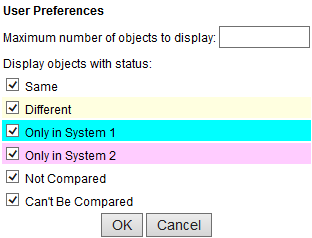Folder objects
When a folder object is selected in a Hierarchy dataset, the Details pane displays a table listing all the objects retrieved into the folder. The table has the following columns:
| Column | Description |
|---|---|
| Status | If the Hierarchy dataset contains comparison results, this column indicates the comparison status of the object. |
| Type | The type of each object. |
| Object | The name of each object. Click a link to display details for the object. |
| Description | The description of each object. |
Click a column heading in the table to sort the data by the selected column. By default, the table is sorted by the Object column.
Each folder in the <Object Type> Results section of the hierarchy may be expanded to display the all the folder’s child objects.
A range of cells may be selected in the table display by using Left Click+Drag in the column headings or table body. Alternatively, use the Shift+Arrow keys to select cells using the keyboard. To select the entire table, choose Select All from the table display’s context menu.
To export the selection to an Excel spreadsheet, choose Export Selection to Excel from the table display’s context menu.
 Options
Options
Click the Options icon to show or hide the Options dialog:

Enter a maximum number of objects to display in the Maximum number of objects to display field. This value applies to all tables viewed by the current user, and is also stored in the Maximum number of rows/objects to display User preferences field.
If the table shows comparison results, select the appropriate checkboxes in the Display objects with status section to display only those objects with the selected comparison statuses. Each LiveCompare user may have their own settings, but the settings apply to all table comparison views.
Click OK to save your changes.
 Export to Excel
Export to Excel
Click the Export to Excel icon to export the table’s contents to an Excel spreadsheet named <Object Name>_<YYYYMMDD_HHMMSS>.xls